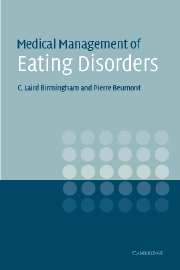Book contents
- Frontmatter
- Contents
- List of color plates
- List of contributors
- List of abbreviations
- Introduction
- PART I THE MEDICAL PERSPECTIVE
- PART II TREATMENT
- PART III SPECIAL ISSUES
- PART IV THE PSYCHIATRIC AND PSYCHOLOGICAL PERSPECTIVE
- PART V AREAS OF SPECIAL INTEREST
- 14 The role of the general practitioner
- 15 Nursing patients with anorexia nervosa
- 16 The role of the dietitian
- 17 Information for family and friends
- Bibliography
- Index
- Plate section
16 - The role of the dietitian
Published online by Cambridge University Press: 18 December 2009
- Frontmatter
- Contents
- List of color plates
- List of contributors
- List of abbreviations
- Introduction
- PART I THE MEDICAL PERSPECTIVE
- PART II TREATMENT
- PART III SPECIAL ISSUES
- PART IV THE PSYCHIATRIC AND PSYCHOLOGICAL PERSPECTIVE
- PART V AREAS OF SPECIAL INTEREST
- 14 The role of the general practitioner
- 15 Nursing patients with anorexia nervosa
- 16 The role of the dietitian
- 17 Information for family and friends
- Bibliography
- Index
- Plate section
Summary
A team approach is vital for effective treatment of eating disorders. The specialist clinical dietitian, as part of the team, is the most qualified person to provide accurate education about nutrition, weight gain, weight maintenance, the resumption of normal eating, and the nutritional methods of avoiding the refeeding syndrome.
Nutrition treatment is not as simple as applying AN educational formula and handing out a diet sheet. Nutrition intervention is complex, and eating disorder patients are resistant to nutritional treatment. Compliance may be reduced by perceived coercion, psychiatric comorbidities such as borderline personality disorders, self-harm, and suicidality, and ethical issues such as the need to report at-risk children to the law. Dietary change may be dependent on the patient's psychological progress.
The objectives of this chapter are to:
Review the range of dietetic interventions that are professionally acceptable to dietitians.
List some methods of dealing with the emotional issues that are likely to occur during treatment.
Promote self-care (supervision) for all dietitians working with eating disordered patients.
Discuss distinctions between specialist and non-specialist dietitians.
Clinical boundaries
Discuss the therapeutic limitations of nutrition counseling and make clear the need for concurrent psychotherapy at the first interview.
Professional boundaries
Work as a member of a team: before initiating any nutrition intervention, make certain that a doctor is following the patient medically on a regular basis and that psychological therapy is being carried out by a qualified practitioner. Emphasize the link between the patient's eating disorder and their emotional health in the dietetic sessions. Set AN upper limit of six dietetic sessions with a patient who is not engaged in a psychological intervention. This is to avoid clouding the dietetic intervention with emotional issues, to encourage psychological treatment, and to protect the patient against inadequate treatment.
[…]
- Type
- Chapter
- Information
- Medical Management of Eating DisordersA Practical Handbook for Healthcare Professionals, pp. 250 - 256Publisher: Cambridge University PressPrint publication year: 2004



